

Efficient energy use. Energy efficiency Efficient energy use, sometimes simply called energy efficiency, is the goal to reduce the amount of energy required to provide products and services.
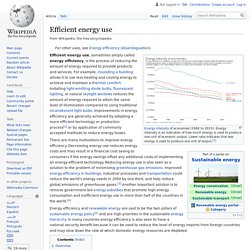
For example, insulating a home allows a building to use less heating and cooling energy to achieve and maintain a comfortable temperature. Installing LED lighting, fluorescent lighting, or natural skylight windows reduces the amount of energy required to attain the same level of illumination compared to using traditional incandescent light bulbs. Improvements in energy efficiency are generally achieved by adopting a more efficient technology or production process[1] or by application of commonly accepted methods to reduce energy losses. There are many motivations to improve energy efficiency. Blog » Blog Archive » GardenBot Is Monitoring Your Garden. GardenBot Is Monitoring Your Garden Davide Gomba — October 21st, 2010 Very interesting bottom-up product (but it’s not really a product, it’s more of an experience of nature-lovers and DIYers) do look after your garden: GardenBot is a garden monitoring system.
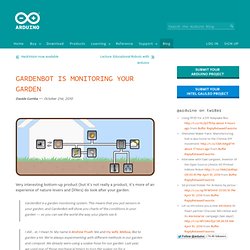
This means that you put sensors in your garden, and GardenBot will show you charts of the conditions in your garden — so you can see the world the way your plants see it. Arduino Assisted Gardening. Hydroponics, greenhouses, water . . Efficient energy use. China Southern Power Grid: World's First LTE Application in Smart Grid - Huawei Solutions. Error loading player: No playable sources found The China southern power grid is committed to becoming a leading power company and providing its users with the best service.
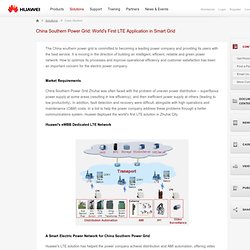
It is moving in the direction of building an intelligent, efficient, reliable and green power network. How to optimize its processes and improve operational efficiency and customer satisfaction has been an important concern for the electric power company. Market Requirements. Smart Grid. Concentrator solar cell with world's highest conversion efficiency of 44.4% Sharp Corporation has achieved the world's highest solar cell conversion efficiency of 44.4%, using a concentrator triple-junction compound solar cell.
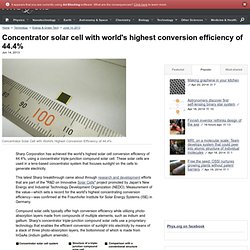
These solar cells are used in a lens-based concentrator system that focuses sunlight on the cells to generate electricity. This latest Sharp breakthrough came about through research and development efforts that are part of the "R&D on Innovative Solar Cells" project promoted by Japan's New Energy and Industrial Technology Development Organization (NEDO). Measurement of the value—which sets a record for the world's highest concentrating conversion efficiency—was confirmed at the Fraunhofer Institute for Solar Energy Systems (ISE) in Germany. Compound solar cells typically offer high conversion efficiency while utilizing photo-absorption layers made from compounds of multiple elements, such as indium and gallium.
Because of their high conversion efficiency, compound solar cells have thus far been used primarily on space satellites. The Top 10 Smart Cities On The Planet. Last year, I spent considerable time researching best practices for climate resilient cities—an endeavor that culminated in what I believe was the first ever global ranking of resilient cities.
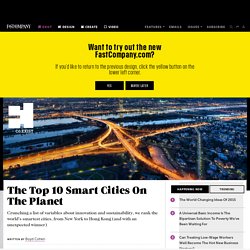
Now, after extensive research on smart cities initiatives around the globe, I have developed what may be the first ever global rankings of smart cities. The term "smart cities" is a bit ambiguous. Some people choose a narrow definition—i.e. cities that use information and communication technologies to deliver services to their citizens. I prefer a broader definition: Smart cities use information and communication technologies (ICT) to be more intelligent and efficient in the use of resources, resulting in cost and energy savings, improved service delivery and quality of life, and reduced environmental footprint—all supporting innovation and the low-carbon economy.
Here, then, are the top 10 smart cities: 1.) 2.) 3.) 4.) 5.) Cities are on the rise. Urbanites 2050. 7 Cities That Are Starting To Go Car-Free. After over a hundred years of living with cars, some cities are slowly starting to realize that the automobile doesn't make a lot of sense in the urban context.
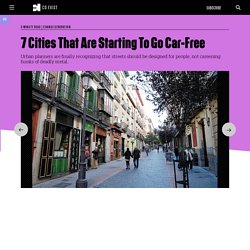
It isn't just the smog or the traffic deaths; in a city, cars aren't even a convenient way to get around. Traffic in London today moves slower than an average cyclist (or a horse-drawn carriage). Commuters in L.A. spend 90 hours a year stuck in traffic. A U.K. study found that drivers spend 106 days of their lives looking for parking spots. Now a growing number of cities are getting rid of cars in certain neighborhoods through fines, better design, new apps, and, in the case of Milan, even paying commuters to leave their car parked at home and take the train instead. Unsurprisingly, the changes are happening fastest in European capitals that were designed hundreds or thousands of years before cars were ever built. Siemens - Smart Grid – The Partner of Choice for Successful Smart Grid Implementations - Smart Grid Solutions. Siemens recognizes that Smart Grid is about the big picture of improved energy delivery, informed consumption and reduced environmental impact.
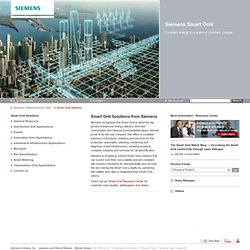
We are proud to be the only company that offers a complete spectrum of products, solutions and services for the protection, automation, planning, monitoring and diagnosis of grid infrastructure, including products, complete solutions and services for rail electrification.